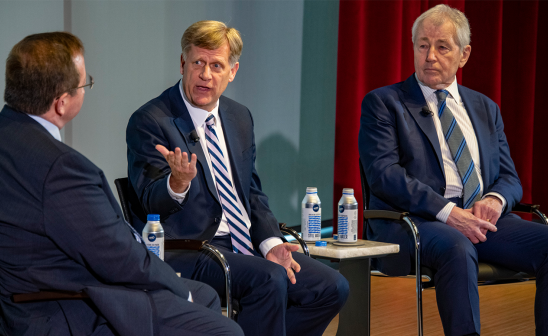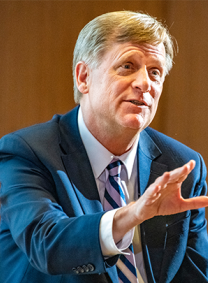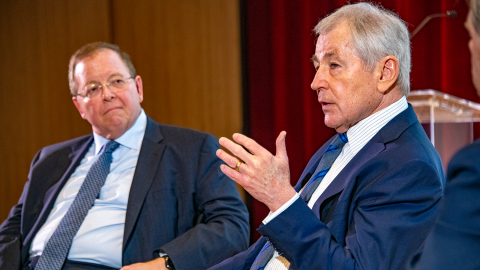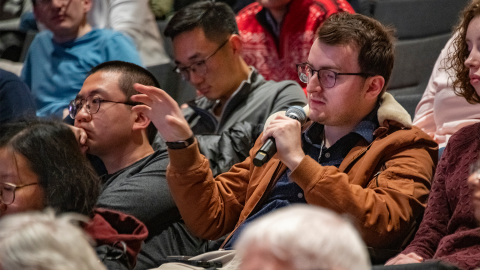Former U.S. ambassador to Russia talks about global reverberations created by war in Ukraine

This article was originally published by UChicago News. Read the story on their site here.
Michael McFaul and former Defense Secretary Chuck Hagel discuss future of democracy during 2023 Hagel Lecture
Thirteen months after Russia’s invasion of Ukraine, former U.S. Ambassador to Russia Michael McFaul and former Secretary of Defense Chuck Hagel sat down to discuss the war and what remains at stake for Ukraine and liberal democracies around the world.
“Everything for America and the free world is at stake,” Hagel said. “There's not one country in the world that’s not been affected by this war.”
The conversation, moderated by political science Prof. Robert Pape, was part of the annual Hagel Lecture series, which aims “to promote open and informed debates on current foreign policy and national security challenges facing the U.S.” Established in 2019, the series is a partnership between the Chicago Project on Security and Threats (CPOST), Hagel and the University of Chicago.
The 2023 Hagel Lecture: “Ukraine, Russia, and the Future of the Liberal Order,” brought together Hagel and McFaul—both of whom served under President Barack Obama. Each was in their former roles when Russia took control of the Crimean Peninsula in 2014.
“We have tremendous challenges with democracy at home. We have tremendous challenges abroad. Ukraine brings these together in a way few topics do,” said Pape, the founding CPOST director. Pape opened the conversation by acknowledging the devastating human cost of the war—hundreds of thousands of people injured and killed and millions of refugees.
The discussion touched on the war’s first year, the role of China and what a Putin victory or loss could mean for countries fighting to maintain their democracies. “This is a pivotal moment in the history of Europe, the history of Ukraine and the history of the world,” McFaul said.
Hagel agreed.
“This is as defining a time in world history as there has been since World War II,” he said.
Year one
When the war began, many analysts believed that a quick, decisive Russian victory was inevitable. However, one year later, Hagel and McFaul reflected on mistaken assumptions—including those held by Russian President Vladimir Putin.
“We did miscalculate,” said McFaul, currently a professor of international studies at Stanford. “We got the war wrong. When you measure power, you count up soldiers, you count up tanks. You miss things like the will to fight.”
Putin underestimated the will of the Ukraine people, Hagel said.
“[Putin] overemphasized the ability of his own military. Big mistake,” he said. “That the Ukrainian people would not just give in. Huge miscalculation.”
Both men praised the leadership of Ukraine’s President Volodymyr Zelensky as well as the Biden administration for imposing sanctions on Russia and for shoring up allies in the region. “Leadership matters. That’s where it starts,” said Hagel, who served as a U.S. senator from Nebraska from 1997-2009.
Currently Russia occupies about 18% of Ukraine, a number that has stagnated. When asked about how to shake off a potential stalemate, McFaul responded: “There’s an assumption in this debate that ‘stalemate’ and ‘complete victory’ are the only two ways that wars end. There’s another scenario we need to put on the table, which is: Putin begins to lose.” According to McFaul, this could bring Putin to the negotiation table.
“This is a pivotal moment in the history of Europe, the history of Ukraine and the history of the world.”
However, McFaul noted that right now there’s not a lot of space for diplomacy. “As long as [Putin] has people to fight in Bakhmut, he’ll keep fighting,” he said.
As Putin continues to systematically destroy the country’s infrastructure, Hagel believes sending more weapons to Ukraine immediately is the best way to help put them in a strong position for deciding the war’s ending. “Where this ends, when it ends and how it ends,” Hagel said. “It’s going to depend a lot on what kind of weaponry and help we can continue to give the Ukrainians.”
A global challenge
Much of the conversation centered on the global consequences of the war and the challenge it poses to the fate of democracy. “The stakes are much bigger than just where the borders of Ukraine are,” McFaul said. “It has implications for this ideological struggle. This is a dictatorship that invaded a democracy.”
Throughout the event, speakers and audience members brought up the ambiguous role of China’s leader Xi Jingping. Though China is officially a neutral party in the war, its influence—and economic ties to Russia—could have the power to sway the conflict’s outcome. Hagel and McFaul also mentioned that the world’s eyes would soon swing to Taiwan, who continues to assert its independence from China.
Hagel said a Putin victory would damage those struggling against autocrats around the globe. “If Putin were to win this, you would see a remarkable decrease in hope, possibilities and these coalitions of common interest,” Hagel said. On the other hand, a Ukrainian victory could help shift the global tide toward democratic values.
Both men agreed there’s no doubt that the war will leave scar tissue for years to come.
“Putin’s war in Ukraine represents the most dangerous challenge to the post-World War II world order that we’ve seen in the last 75 years,” said Hagel. “The repercussions are going to be felt throughout the world for many years.



